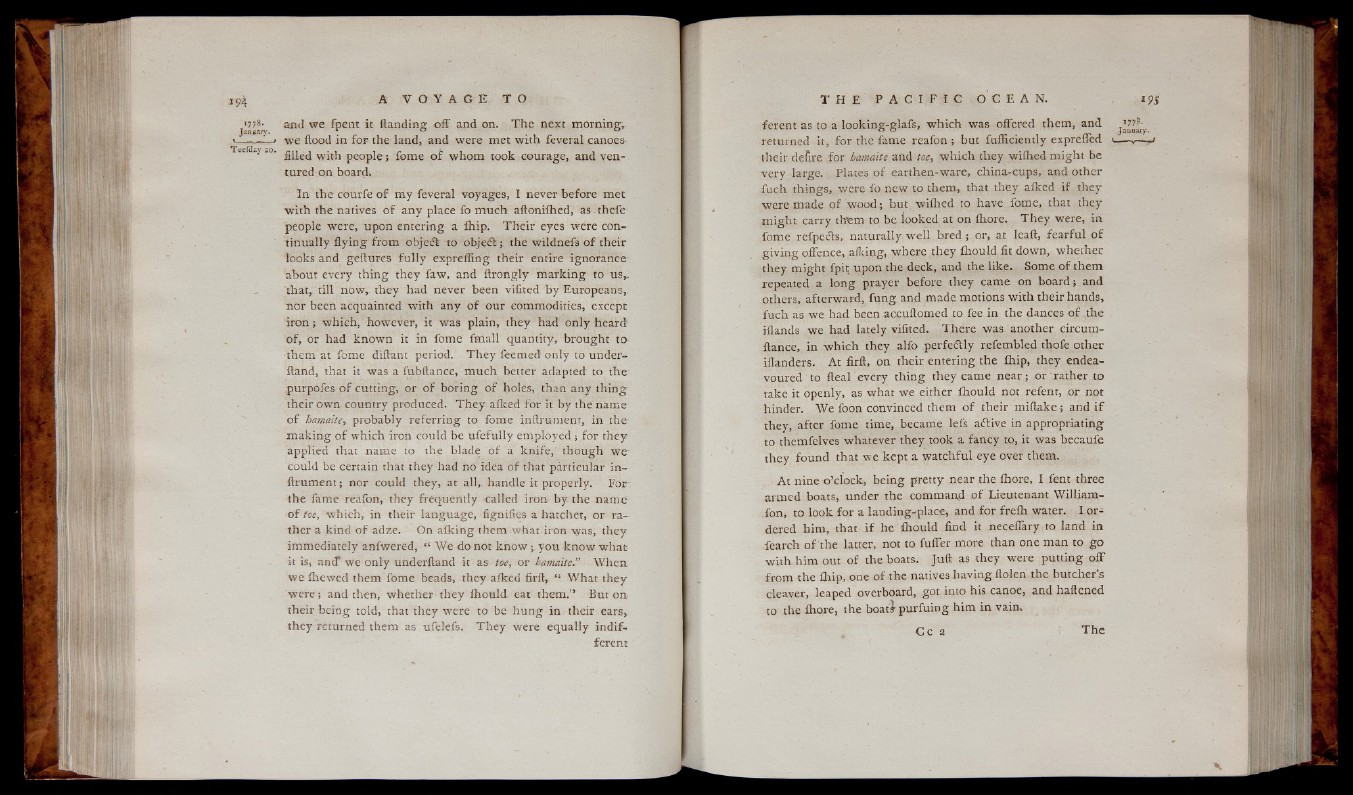
w 8- and we fpent it {landing o ff and on. T h e next morning,
>-—"---- 1 we flood in for the land, and were met w ith feveral canoes
ue 2°‘ filled with people ; fome o f whom took courage, and ventured
on board.
In the courfe o f m y feveral voyages, I never before met
w ith the natives o f any place fo much aftoniihed, as thefe
people were, upon entering a ihip. T h e ir eyes were continually
fly in g from objedl to o b je f l ; the wildnefs o f their
looks and geftures fu lly exprefling their entire ignorance
about every thin g they faw, and ftrongly ma rk in g to us,,
that, till now, they had never been vifited by Europeans,,
nor been acquainted with any o f our commodities, except
i r o n ; which, however, it was plain, they had only heard
o f, or had known it in fome fmall quantity, brought to-
them at fome diftant period. T h e y feemed only to under-
itand, that it was a fubftanee, much better adapted' to the
purpofes o f cutting, or o f boring o f holes, than any th in g
their own country produced. T h e y afked for it by the name
o f hamaite* probably re ferrin g to fome inftrument, in the
m a k in g o f which iron could be u fe fu lly employed ¡ for they
applied that name to the blade o f a kn ife, though we-
could be certain that they had no idea o f that particular in -
ftrument; nor could they, at all, handle it properly. For
the fame reafon, they frequently called iron by the name
o f toe, which, in their languag e, fignifies a hatchet, or rather
a kind o f adze. On a ik in g them what iron tyas, they
immediately anfwered, “ We do not k n o w ; you kn ow w h a t
it is, and* we only underftand it as toe, or hamaite” When,
we fhewed them fome beads, they alked firft, “ What they
w e r e ; and then, whether they lhould eat them.” But on
their being told, that they were to be h u n g in their ears,
they returned them as ufelefs. T h e y were equ ally indifferent
ferent as to a looking-glafs, w hich was offered them, and
returned it, for the fame reafon ; but fufficiently exprefled 1— .— -j
their defire fo r hamaite and toe, w h ich they wiihed migh t be
very large. Plates o f earthen-ware, china-cups, and other
fuch things, were fo new to them, that they aiked if they
were made o f wood ; but wiihed to have fome, that they
m igh t carry them to be looked at on ihore. T h e y were, in
fome refpefls, naturally w e ll b r e d ; or, at leait, fea rfu l o f
g iv in g offence, aiking, where they ihould fit down, whether
they might fpit upon the deck, and the like. Some o f them
repeated a long prayer before they came on board ; and
others, afterward, furig and made motions w ith their hands,
fuch as we had been accuftomed to fee in the dances o f the
iflands we had lately vifited. T he re was another circum-
ftance, in w h ich they alfo perfectly refembled thofe other
iflanders. At firft, on their entering the ihip, they endeavoured
to ileal every thin g they came n e a r ; or rather to
take it openly, as what we either ihould not refent, or not
hinder. We foon convinced them o f their m iftak e ; and i f
they, after fome time, became lefs aftive in appropriating
to themfelves whatever they took a fancy to, it was becaufe
they found that we kept a w atchfu l eye over them.
At nine o’clock, being pretty near the ihore, I fent three
armed boats, under the command o f Lieutenant William-
fon, to look for a landing-place, and fo r fre ih water. I ordered
him, that i f he ihould find it neceffary to land in
fearch o f the latter, not to fuffer more than one man to go
w ith him out o f the boats. Juft as they were putting off
from the ihip, one o f the natives having ftolen the butcher s
cleaver, leaped overboard, got into his canoe, and haftened
to the ihore, the b o a tlp u r fu in g him in vain.
G c 2 T h e